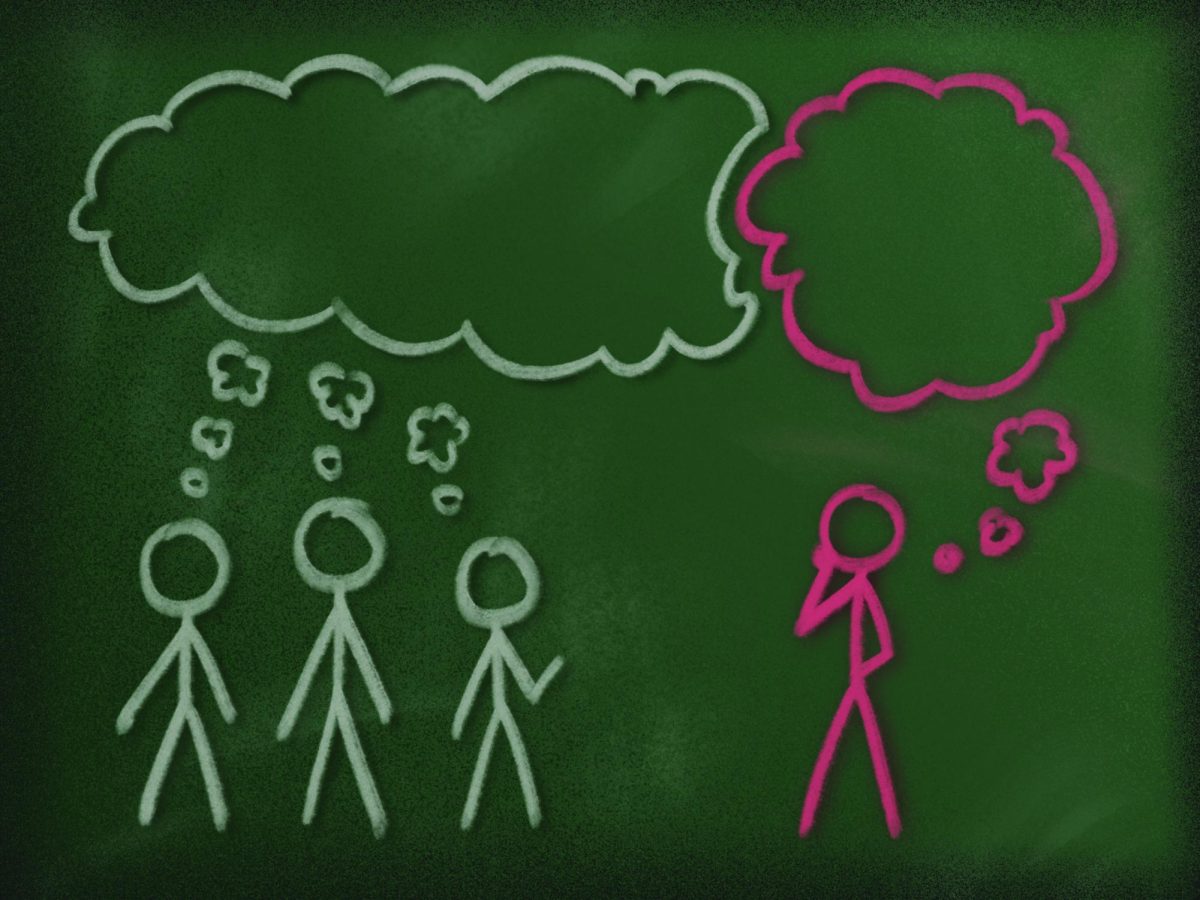Insensitive comments. Profane language.
They’ve existed for years.
In 1939 for example, the movie “Gone With the Wind” took over the film industry by storm.
But its rise to prominence came with significant controversy — the incorporation of the word “damn” in one of its most iconic lines sparked a back-and-forth battle between those supporting either its censorship or inclusion.
Although the fight ended with a victory for the word’s retention in the film, the contentious feud highlighted the strict regulations and expectations surrounding what people deemed as socially acceptable language, especially with content displayed to the public.
Fast forward more than eight decades later, where the landscape of social expectations has shifted dramatically and still continues to evolve.
These changing social dynamics have created new norms in countless everyday situations, whether it be weaving through school hallways during passing periods. Pushing through the burn of lactic acid during a workout after school. Or maybe it’s waiting in an endless checkout line at Costco. Wandering a crowded street in New York City during a vacation.
Moments like these fill up much of our lives. Yet amid these normal daily occurrences, some might notice that the casual speech we always hear in these environments has become increasingly unfiltered.
According to a poll conducted by Preply, an online language tutoring company, there has been a growing trend in the world, especially in the past decade — swearing has become steadily less offensive to the general population.
A word that once created a polarizing, international film scandal is now frequently floating in the air around us, commonplace in casual dialogue. And that’s just one example of the larger trend.
With this evolution, some broader questions are raised: Does this shift in the data show the erosion of a social high bar that society has long upheld? Or is it time to adapt and change with the times?
As norms continue to shift through different generations, the impact of language, whether playful or harmful, shapes how people interact with one another and how they perceive each other.
The question is no longer just about whether language is or isn’t offensive but about how its use reflects the principles we stand for and the environment we create.
“I think this type of language has always existed, but I think that now it’s used so often that people have become numb to it,” Associate Athletic Director Josh Friesen said. “It no longer has the same effect that it might have had at one time in the past, where it really gets your attention. Now, it’s just so overused that the shock value from before has gone away.”
This change in the perceived weight of language reflects not only cultural desensitization but also reveals the decreasing impact of traditional “cuss words.”
As our vocabulary changes, some common words lose their emphatic abilities, so for some kids, profane language is often used more casually, sometimes as a way to project confidence or emphasize what they are saying.
“Middle Schoolers and some Upper Schoolers often drop curse words because they think it makes them look cool, but I wish they understood that it actually does the opposite,” Victor F. White Master Teaching Chair in English GayMarie Vaughan said. “There’s a saying that ‘out of the abundance of the heart, the mouth speaks,’ and I believe that’s the core issue. Potentially harmful words stem from what’s inside someone. And those words, even if said unintentionally, have the capacity to hurt others, especially when directed, which is not acceptable.”
One of the challenges of trying to minimize the usage of language that has already become so popular and cemented in this generation is that suppressing what feels natural, even if it may be an expletive not socially appropriate in general, is nearly impossible.
“In an athletic environment, where emotions are often high, people sometimes become more primal, and that’s when your emotions can get the better of you,” Friesen said. “So sometimes your filter goes away a little bit because of the raw emotion involved.”
Friesen also believes that especially in places where students might feel there’s a lower standard for conduct, such as athletic locker rooms, behavior tends to be more loose.
And because current generations are now digitally connected more than ever before, several modern factors contribute to the spread of language trends.
Among them, Friesen believes that social media plays a key role, serving as a catalyst that amplifies the way language evolves and normalizes phrases that might once have been deemed offensive.
“I think it might not even be things that they’re saying, but just things that they’re listening to on the radio or on social media or what kind of music and other content they’re streaming that’s not necessarily great for them to hear,” Friesen said. “So overall, I definitely think outside media is a big influence. It kind of makes that behavior mainstream.”
In Vaughan’s eyes, a major concern on campus is that the growing normalization of offensive language has begun to trickle down to Lower Schoolers. As a result, she believes that their perception of the weight and impact that simple insults can truly carry is susceptible to being blurred.
“Once, I overheard a young first or second grade boy yelling a slur at his friend while they were playing wall ball after school,” Vaughan said. “I stopped and asked him to repeat what he said. Of course, he wouldn’t, realizing it was inappropriate. That moment was an opportunity to teach — why use words to make others feel less than? We want this school to be a place where everyone feels like they belong, and language like that works against it.”
Most of the time, this type of language is exchanged between close friends in the playful spirit of a joke. But for Vaughan, such humor can carry hidden dangers. Especially when this behavior becomes a habit, it risks normalizing insensitivity and crossing boundaries that might lead to genuine offense.
“Jokes that target someone’s race, ethnicity, gender or religion always cross the line,” Vaughan said. “There’s nothing anyone can do about those characteristics, so they shouldn’t be used as the butt of a joke. If we’re serious about leadership and character, we need to focus on building each other up rather than tearing each other down.”
Vaughan also believes that this ripple effect becomes especially concerning in a school setting, where younger students often mimic what they observe from older peers.
Without understanding the full weight of their words, these habits can unintentionally shape the broader campus culture at school.
“What Upper Schoolers say and do often trickles down to younger kids. Even if they don’t fully understand what they’re saying, the words stick,” Vaughan said. “We need to be mindful of how our behavior influences the culture on campus. The kids here really look up to the Upper Schoolers, physically and spiritually. Think about the people that they respect. How are the people that they respect talking about people and to other people?”
From past experiences, Vaughan discovered a common social misconception that younger people tend to believe — that profane or inappropriate language is the same as “adult language,” a normal and natural thing to do as people age.
From her perspective, this belief should be reconsidered.
“As adults or older students, the behavior we model has a huge influence on younger kids, so we should be mature, balanced, respectful, disciplined and self-aware,” Vaughan said. “You have to remember that little eyes are watching everything we do. True adults, true men, don’t use these words. Hopefully, the adults around here practice a lot of that. If we want them to act respectfully, we need to show them how.”
Keeping the influence that faculty members and mentors have on campus through their actions in mind, potential solutions to the issue of social insensitivity become apparent. Though immediate fixes are unrealistic, Friesen agrees with Vaughan that some of the first steps to take include being a positive role model on top of also directly addressing those at fault.
“I think that’s where mentorship comes in,” Friesen said. “Sometimes you gotta pull a guy aside and say, ‘Hey, do you realize how that could have made that guy feel?’ Or even though something might not be offensive to someone else, it might make people around feel uncomfortable.”
While this method of acting as an external guiding figure can help steer social behavior in the right direction, Friesen believes that people also need to have self-accountability.
For him, being accountable for one’s own actions, having the courage to take it upon themselves to address their own shortcomings and understanding the social expectations of their environment is crucial.
“I think being aware of your surroundings is crucial,” Friesen said. “I also think being aware of the potential for offending others should be taken into account. One example could be like when you’re surrounded by people of all ages and backgrounds, where having no filter on your language is pretty much unacceptable.”
In the instance that someone realizes they might have let loose inappropriate words, self-reflection and the authentic wish to make amends can go a long way in healing the situation.
“There’s power in a genuine apology or genuine compliment,” Vaughan said. “Saying, ‘I said something harmful, and I did it to make myself feel better, but that was wrong, and I’m truly sorry,’ can resonate deeply and help repair relationships. People have to take responsibility for their words just like they do with homework or other aspects of their lives.”
Ultimately, dealing with the issue of social insensitivity, not only at school but also in any other occasion, boils down to upholding fundamental moral principles.
“We need to lead with empathy and humility,” Vaughan said. “If you wouldn’t say something in front of your grandmother or teacher, maybe it shouldn’t be said at all. And if you’re worried about crossing a line, err on the side of kindness and caution.”









